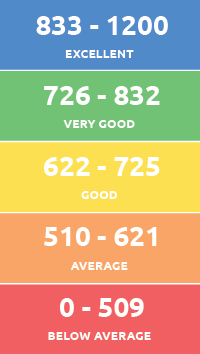Personal loans: How much can I borrow? Will I be approved?
There are often circumstances that lead us to borrowing money. Whether it’s for a major purchase, personal emergencies, investment opportunities or simply to consolidate debt.
When this need arises, you may ask yourself: How much can I borrow when getting a personal loan? How long does it take to get it approved and will my application actually be approved?
This blog post aims to give you a little bit of insight into the consideration of getting a personal loan, from both your perspective and the lender’s.
Affordability
Affordability is a major determinant in regards to how much you can borrow and whether or not you will be approved.
When applying for a personal loan, the lender will ask you questions about your income and expenses. The expenses will include things such as rent or mortgage repayments, other loans and general living expenses.
The difference between your income and outgoing expenses will be a major determining factor as to how much you can borrow.
So calculate how much you have remaining by the end of the month. If you have only $100 left over, your borrowing power is significantly less than if you had $500 left over.
Dependants
If you’re caring for children, your parents or anyone else, this will be taken into consideration, because having dependants can results in unforeseen expenses.
When you visit our personal loans comparison page you can use the filter to see repayment results for different loan amounts over different terms.
Credit history
When you apply for a loan, lenders use credit rating agencies (such as Equifax and Dun & Bradstreet) to look up your “credit score”. Credit rating agencies collect and provide information about your financial history.
The records kept include other loans or credit cards you may have applied for, your last known employer, directorships your may hold and any defaults you may have had. This information results in your own personal “credit score”.
What does the score indicate?
The higher your score, the more likely your application will be approved. However, it is no guaranteed.
When comparing personal loans, you will see personal loan products with the description “Excellent”, “Very good”, etc. If you’re wondering what the lenders constitute as “excellent” or “very good”, the below chart is a good indicator.

Personal loan interest rates determined by credit score
There are now a number of companies in Australia, that determine your interest rates based on your credit rating. The lower your risk profile (your likelihood of defaulting), the lower your interest rates. Conversely, the lower your credit score, the higher your interest rate may be. Examples of companies that personalise your interest rate, based on your credit score include:
Comprehensive Credit Reporting (CCR)
Recently financial institutions have started implementing Comprehensive Credit Reporting (CCR) or ‘positive reporting’. This refers to additional information being provided to, and held by Credit Reporting Agencies. These changes allow credit providers to access and use this information to make more informed lending decisions.
CCR means that a more complete picture of an individual’s credit profile can be held on their credit file. The outcome of CCR means, your positive actions (such as always making your repayments on time) will be visible to the lender. Note, not all lenders have rolled out CCR.
Defaults and missed payments
Sometimes mistakes happen. For example, you may have not received a bill and accidentally missed a payment.
Loan purpose
Some lenders have a broad scope of loan purposes for which they will lend money, whilst others will only lend for a narrow range or purposes. For example, not many lenders will provide you money to invest in Bitcoin or pay for legal fees, however, many lenders are willing to lend for debt consolidation, weddings and holidays.
It is worthwhile contacting the lender to ask whether or not they lend for your required personal loan purpose.
Financial activity
Many lenders will require copies of your most recent bank statements to assess how your money is spent and to see whether or not the information you provided about your expenses lines up with your recent banking history.
Habits such as regular gambling (shown by regular withdrawals at the casino, etc) will reduce your likelihood of being approved.
Employment status and salary
Lenders will ask about your current employment status and sources of income. Many lenders will state on their website as to whether or not they require a minimum income or employment status. Minimum income levels vary between $20,000 and $50,000 per annum.
Lenders will also want to verify those sources of income. So if you’re getting paid cash-in-hand, before you apply for a personal loan, you may want to start depositing that money in a bank to demonstrate you’re earning a regular income.
Assets and savings
Assets such as a car and other possessions you may have, could increase your likelihood of getting a loan. Have a loan secured by something like your car, could reduce your interest rate.
Some financial institutions allow you to secure a loan against a term deposit you may hold with them.
Minimum age
Many lenders will lend to you if you’re over 18 whilst others have a stricter criteria and will not lend to borrowers under the age of 21 or older. Be sure to check with your lender to see what their eligibility criteria is.
Residential status
Most Australian lenders require you to be an Australian citizen or permanent resident.
457 Visa holders
Some major Australian banks and independent lenders allow 457 visa holders to get a personal loan. However, you have to ensure you meet the eligibility criteria listed above. Contact your preferred lender to see if they accept applications from 457 visa holders.
Be honest
The lender’s rely on the honesty of the potential applicant. Being dishonest or providing misinformation could damage a your chances of being approved. Moreover, if you ask for more than you can afford – you will run a higher risk of running into financial hardship.
Dennis Graham is a seasoned finance professional working within Banking, Lending and Novated Leasing. An expert finance writer, Dennis combines industry insights with clear communication to deliver insights into financial products.
Latest posts

What You Should Know: Comprehensive vs. Third Party Car Insurance.
28.07.2020

What You Need to get a Mortgage in Australia
11.04.2019

What is a term deposit and how does it work?
04.06.2018
